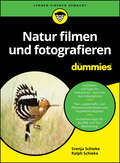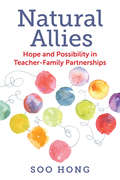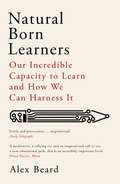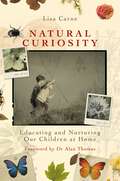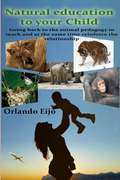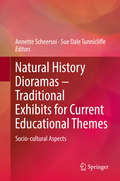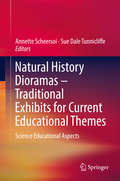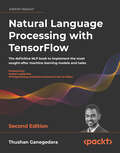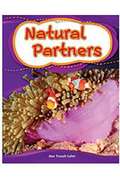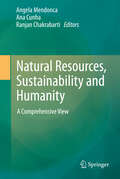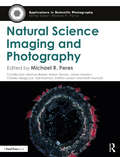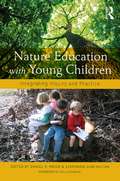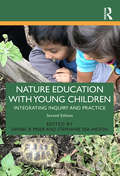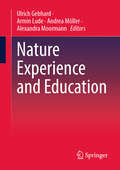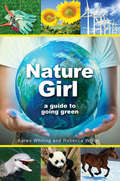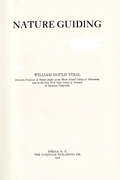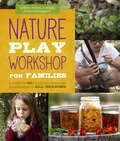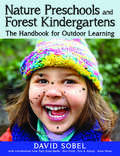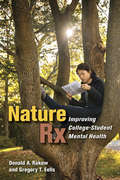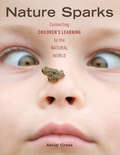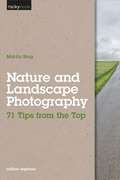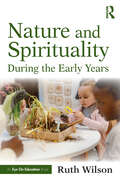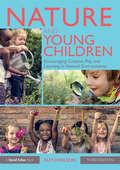- Table View
- List View
Natur filmen und fotografieren für Dummies (Für Dummies)
by Svenja Schieke Ralph SchiekeFangen Sie spannende Motive in der Natur ein – mit Ihrer Kamera Schon mit wenig Ausrüstung können Sie wunderbare Momente festhalten – nicht nur in Einzelbildern, sondern auch im Film. Wie Sie Landschaften und Tiere filmen und fotografieren, lernen Sie in diesem Buch. Svenja und Ralph Schieke zeigen Ihnen Schritt für Schritt von der Planung bis zur Veröffentlichung, wie spannende und interessante Naturfotografien und Naturfilme mit dem gewissen Etwas entstehen. Sie erfahren, wie Sie Motive finden, welche Ausrüstung Sie benötigen, was Sie bei den Aufnahmen beachten müssen und wie Sie Ihre Ergebnisse weiter bearbeiten. Sie erfahren Wie Sie auch mit Ihrem Smartphone gelungene Aufnahmen machen Warum sich die Stadt nicht verstecken muss, wenn es um Naturaufnahmen gehtWie Sie einen Film planen und in der Natur Schritt für Schritt umsetzenWo Sie Ihre Aufnahmen präsentieren können
Natural Allies: Hope and Possibility in Teacher-Family Partnerships
by Soo HongIn Natural Allies, Soo Hong offers a paradigm shift in how we think about family engagement with schools. Hong challenges the conventional depiction of parents and teachers as &“natural enemies,&” and shows how, through teachers&’ initiative and commitment, they can become natural allies instead. Based on a three-year ethnographic study, the book features the experiences and motivations of five urban school teachers who have successfully created meaningful, productive relationships and partnerships with students&’ families. In Natural Allies, the teachers&’ personal narratives are juxtaposed with rich descriptions of their interactions with families and children. The book explores how the dimensions of race, class, culture, and family history shape the interactions between teachers and families, particularly in schools where teacher-parent dynamics may be fraught with distrust or misunderstanding. The book demonstrates how commitment to families and community can become a central part of educators&’ development as professionals. In addition, the research provides new insight and seeks to merge the study of family engagement with the field of culturally relevant and sustaining pedagogies. Offered with optimism and urgency, Natural Allies addresses an area in which many educators feel ill equipped and unprepared. Readers will emerge from a reading of the book with new ideas on family engagement that are grounded in an analysis of the deep contours of the parent-teacher relationship.
Natural Born Learners: Our Incredible Capacity to Learn and How We Can Harness It
by Alex BeardLearning is the soul of our species. From our first steps to our last words, we are what we learn. But for all its obvious importance, learning has lost touch with human progress. We live in an information age, work in a knowledge economy, yet our schools are relics of an industrial era. Education insider Alex Beard takes us on a dazzling tour of the future of learning to show how we can - and why we must - do better. Tackling everything from artificial intelligence to our growing understanding of the infant brain, Natural Born Learners is a user's guide to transforming learning in the twenty-first century and roadmap to accessing our better future selves.
Natural Curiosity: Educating and Nurturing Our Children at Home
by Dr Alan Thomas Lisa CarneNatural Curiosity is a warm and contemplative insight into one family's experience of moving from mainstream schooling to home education, and learning through the lens of nature and natural history. Since becoming 'unschooled', the two children have thrived on a diet of self-directed play and learning, amassing life skills, confidence, responsibility, and a vast array of knowledge along the way. This thoughtful book touches upon important themes in education and environmentalism, such as children's rights in schooling, the use and place of technology in learning, and the absence of the natural world in mainstream education. It gives a considered, balanced view of home schooling, interspersed with entertaining tales including constructing life-sized mammoth skeletons and living for a day as historically accurate Vikings. It offers an understanding of how this type of education works and what inspires the choice to pursue it.
Natural Curiosity: Educating and Nurturing Our Children at Home
by Lisa CarneNatural Curiosity is a warm and contemplative insight into one family's experience of moving from mainstream schooling to home education, and learning through the lens of nature and natural history.Since becoming 'unschooled', the two children have thrived on a diet of self-directed play and learning, amassing life skills, confidence, responsibility, and a vast array of knowledge along the way. This thoughtful book touches upon important themes in education and environmentalism, such as children's rights in schooling, the use and place of technology in learning, and the absence of the natural world in mainstream education. It gives a considered, balanced view of home schooling, interspersed with entertaining tales including constructing life-sized mammoth skeletons and living for a day as historically accurate Vikings. It offers an understanding of how this type of education works and what inspires the choice to pursue it.
Natural Education To Your Child
by Orlando EijoI am an animal trainer, I study wild behavior of animals from a pedagogical point of view; I was very surprised to watch how some human mothers need to shake their children in the streets, shouting. With capricious boys and girls touching everything in the store or heading to the street dangerously, with their mothers running behind them shouting. Why a little goat from the mountain knows from early childhood that it must not go near the cliffs? Are they more intelligent that our children? of course, not. Our children reach the intelligence of an adult wolf at the age 2, and at 6, they are as intelligent as a chimpanzee, to intellectually overcome all animals from that age. I want to share with you the simple and natural training methods animals use to raise their children.
Natural History Dioramas – Traditional Exhibits for Current Educational Themes: Science Educational Aspects
by Sue Dale Tunnicliffe Annette ScheersoiThis book focuses on socio-cultural issues and the potential of using dioramas in museums to engage various audiences with – and in – contemporary debates and big issues, which society and the natural environment are facing, such as biodiversity loss.From the early 1900s, with the passage of time and changes in cultural norms in societies, this genre of exhibits evolved in response to the changes in entertainment, expectations and expressed needs of museum visitors. The challenge has always been to provide meaningful, relevant experiences to visitors, and this is still the aim today. Dioramas are also increasingly valued as learning tools. Contributions in this book specifically focus on their educational potential. In practice, dioramas are used by a wide range of educational practitioners to assist learners in developing and understanding specific concepts, such as climate change, evolution or or conservation issues. In this learning process, dioramas not only contribute to scientific understanding and cultural awareness, but also reconnect wide audiences to the natural world and thereby contribute to the well-being of societies.In the simultaneously published book: “Natural History Dioramas – Traditional Exhibits for Current Educational Themes, Science Educational Aspects" the editors discuss the history of dioramas and their building and science learning aspects, as well as current developments and their place in the visitor experience.
Natural History Dioramas – Traditional Exhibits for Current Educational Themes: Science Educational Aspects
by Sue Dale Tunnicliffe Annette ScheersoiThis book presents the history of natural history dioramas in museums, their building and science learning aspects, as well as current developments and their place in the visitor experience. From the early 1900s, with the passage of time and changes in cultural norms in societies, this genre of exhibits evolved in response to the changes in entertainment, expectations and expressed needs of museum visitors. The challenge has always been to provide meaningful, relevant experiences to visitors, and this is still the aim today. Dioramas are also increasingly valued as learning tools. Contributions in this book specifically focus on their educational potential. In practice, dioramas are used by a wide range of educational practitioners to assist learners in developing and understanding specific concepts, such as climate change, evolution or or conservation issues. In this learning process, dioramas not only contribute to scientific understanding and cultural awareness, but also reconnect wide audiences to the natural world and thereby contribute to the well-being of societies.In the simultaneously published book: “Natural History Dioramas – Traditional Exhibits for Current Educational Themes, Socio-cultural Aspects” the editors focus on socio-cultural issues and the potential of using dioramas to engage various audiences with – and in – contemporary debates and big issues, which society and the natural environment are facing.
Natural Language Processing with TensorFlow: The definitive NLP book to implement the most sought-after machine learning models and tasks, 2nd Edition
by Thushan Ganegedara Andrei LopatenkoFrom introductory NLP tasks to Transformer models, this new edition teaches you to utilize powerful TensorFlow APIs to implement end-to-end NLP solutions driven by performant ML (Machine Learning) modelsKey FeaturesLearn to solve common NLP problems effectively with TensorFlow 2.xImplement end-to-end data pipelines guided by the underlying ML model architectureUse advanced LSTM techniques for complex data transformations, custom models and metricsBook DescriptionLearning how to solve natural language processing (NLP) problems is an important skill to master due to the explosive growth of data combined with the demand for machine learning solutions in production. Natural Language Processing with TensorFlow, Second Edition, will teach you how to solve common real-world NLP problems with a variety of deep learning model architectures. The book starts by getting readers familiar with NLP and the basics of TensorFlow. Then, it gradually teaches you different facets of TensorFlow 2.x. In the following chapters, you then learn how to generate powerful word vectors, classify text, generate new text, and generate image captions, among other exciting use-cases of real-world NLP. TensorFlow has evolved to be an ecosystem that supports a machine learning workflow through ingesting and transforming data, building models, monitoring, and productionization. We will then read text directly from files and perform the required transformations through a TensorFlow data pipeline. We will also see how to use a versatile visualization tool known as TensorBoard to visualize our models. By the end of this NLP book, you will be comfortable with using TensorFlow to build deep learning models with many different architectures, and efficiently ingest data using TensorFlow Additionally, you'll be able to confidently use TensorFlow throughout your machine learning workflow.What you will learnLearn core concepts of NLP and techniques with TensorFlowUse state-of-the-art Transformers and how they are used to solve NLP tasksPerform sentence classification and text generation using CNNs and RNNsUtilize advanced models for machine translation and image caption generationBuild end-to-end data pipelines in TensorFlowLearn interesting facts and practices related to the task at handCreate word representations of large amounts of data for deep learningWho this book is forThis book is for Python developers and programmers with a strong interest in deep learning, who want to learn how to leverage TensorFlow to simplify NLP tasks.Fundamental Python skills are assumed, as well as basic knowledge of machine learning and undergraduate-level calculus and linear algebra. No previous natural language processing experience required.
Natural Partners (Focus Forward #Orange Level)
by Alan Trussell-CullenNatural partners are animals or plants that live or work together to help themselves and each other.
Natural Resources, Sustainability and Humanity: A Comprehensive View
by Ana Cunha Angela Mendonca Ranjan ChakrabartiShortly, this book is the written up-graded version of the topics discussed during the Small Meeting of the 2nd International School Congress: Natural Resources, Sustainability and Humanity, held in Braga, Portugal, 5-8 May 2010 with the diverse participation of scientists, educators and governmental representatives. The Earth hosts an immense ecosystem, colonized by millions of species for billions of years but only for a few tens of thousands of years by humans. Environmental history tells though that it was humankind that shaped the environment as no other species. History, geography, religion and politics among other reasons have differentiated populations with respect to access to safe food and water, education, health, and to space and natural resource utilization. The globalization era of trade, information and communication is shortening distances and increasing overall wealth, but, as is pointed out in this book, it is also contributing to the propagation of diseases, and to the modification or even destruction of native ecosystems by exotic invasive species. Man is the only species that has the perception of its history, evolution, of the consequences of its decisions, and that there is a future ahead. It is also the only species that has the potential to change it. This awareness can be a source of anxiety and contradictory behaviours, but it is also the key to changing attitudes towards the construction of a common sustainable home, by committed education, interdisciplinary approaches, mobilization and empowerment of people and political consonant actions.
Natural Science Imaging and Photography (Applications in Scientific Photography)
by Michael R. PeresThis book provides an in-depth exploration of scientific photography. Highlighting the best practices needed to make, distribute, and preserve scientific visual information using digital photographic methods and technologies, it offers solutions to some of the biggest challenges facing photographers. Written by a team of international, award-winning image makers with over 300 years of cumulative experience, this comprehensive resource explains the foundations used, the tools required, and the steps to needed for creating the optimal photograph in a range of environments and circumstances. Topics covered include: • ethical practices • aerial photography • close-up and macro photography • computational photography • field photography • geological photography • imaging with invisible spectrums • photographing small animals in captivity • time-based imaging • image processing in science Showcasing modern methods, this book equips readers with the skills needed to capture and process the best image possible. Designed for basic and intermediate photographers, Natural Science Imaging and Photography exists as an essential contemporary handbook.
Nature Education with Young Children: Integrating Inquiry and Practice
by Daniel R. Meier Stephanie Sisk-HiltonNature Education with Young Children is a thoughtful, sophisticated teacher resource that blends theory and practice on nature education, children's inquiry-based learning, and reflective teaching. The book’s guiding conceptual framework is founded upon the integration of four key ideas for effective and transformative nature education: • The power and value of equity and access to nature education• Effective teaching encompasses child development domains and integrates ECE curriculum • Children learn best through inquiry-based and child-centered teaching• Powerful teaching is founded upon teacher inquiry and reflection. Implementing nature study is one critical way that educators can integrate more science learning across the ECE curriculum and do so in an active, discovery-based manner. Nature Education with Young Children strives for an American version of what the Reggio Emilia educators do so well: creating a seamless integration of science concepts into the daily intellectual investigations that occur in classrooms everywhere.
Nature Education with Young Children: Integrating Inquiry and Practice
by Daniel R. Meier Stephanie Sisk-HiltonNow in a fully updated second edition, Nature Education and Young Children remains a thoughtful, sophisticated teacher resource that blends theory and practice on nature education, children's inquiry-based learning, and reflective teaching. Reorganized to enhance its intuitive flow, this edition features a Foreword by David Sobel and three wholly new chapters examining nature and literacy in kindergarten, outdoor play and children’s agency in a forest school, and the power of nature inquiry for dual language learners. Revised to reflect the latest research and guidelines, this book offers a seamless integration of science concepts into the daily intellectual and social investigations that occur in early childhood. With a fresh framing of nature exploration in the context of our current educational landscape, this text is a comprehensive guide for educators and students looking to introduce and deepen connections between nature education and teacher inquiry and reflection.
Nature Experience and Education (Contributions from Biology Education Research)
by Ulrich Gebhard Armin Lude Andrea Möller Alexandra MoormannExperiencing nature has positive effects on mental development, health, and well-being, and can be interpreted as an element of a &“good life.&” This book relates this connection to learning and educational settings. Educational processes in biology education are defined not only by the acquisition of relevant subject matter but also about the encounter, confrontation, and transformation of the self. The central assumptions of this book are, firstly, that the latter can be facilitated through nature experiences, and secondly, that this can also positively influence (subject-specific) learning processes.
Nature Girl: A Guide to Caring for God's Creation
by Karen Whiting Rebecca WhiteLove God, Love the Planet As you become an expert in all things green, Nature Girl offers fun ways to care for God’s creations while enjoying the wonders of nature! With activities, recipes, science experiments, and much more, you can discover how to create recycled jewelry, plan a spa day with friends, make your own earth-friendly skin care products, or team up to clean a park or a neighbor’s yard. Each chapter covers different topics, like water, air, energy, and recycling, and includes crafts, Scripture, games, quizzes, interviews with experts, and quotes from real girls like you. From the itty-bitty flowers at your feet to the air high above your head, discover how you can make a difference for our planet.
Nature Guiding
by William Gould VinalNature Guiding is the science of inculcating nature enthusiasm, nature principles, and nature facts into the spirit of individuals. "Doing" nature-study means observing, wondering, and solving problems. It could include collecting, building, measuring, painting, planning, writing, touching, experimenting or any of a wide range of other activities. Most importantly, it allows children to be "original investigators."This book is intended as a resource for teachers and students engaged in nature study at summer camps and in schools. William Gould Vinal believed that the teacher of nature study should be "in sympathy with the simple life and the country way," that the nature study should emphasize observation of the interactions of plants and animals in their environment, and not be reduced to matters of taxonomy and anatomy. In Nature Guiding, he offers advice to camp counselors and school teachers on incorporating nature study into everyday activities, as well as suggestions for parents and others about using visits to state and national parks to teach nature lore.
Nature Photography: Insider Secrets From The World's Top Digital Photography Professionals
by Chris WestonHave you ever wondered what it is that professional photographers do day in and day out that enables them to take consistently compelling images? Or thought that unravelling the insider secrets of the professionals could inspire you? Nature Photography: Insider Secrets from the World's Top Digital Photography Professionals takes a contemporary and innovative approach to revealing the day-to-day habits of the world's most successful wildlife, landscape and macro photographers, divulging the core skills and techniques through which they excel. This book is crammed full with expert advice taken from the world's leading pros directly from the field. It will empower the development of your skills to a professional level and fire your imagination. Starting with the basics of how to plan a rewarding field trip, whether locally or afar, for one day or a month, and covering all aspects of camera handling and photographic technique including: how to make perfect exposures every time, ensure pin-sharp images of moving subjects, decipher the complexities of camera menus and controls, and break through the mysteries of composition. And, having learned the secrets to success, the book maps out some simple yet powerful photo exercises and self-assignments to encourage you to explore all facets of digital photography and put into practice the essential skills that will make you, too, a highly successful photographer.
Nature Play Workshop for Families: A Guide to 40+ Outdoor Learning Experiences in All Seasons (Workshop For Kids Ser.)
by Monica Wiedel-Lubinski Karen MadiganNational Outdoor Book Award Winner: A fun, practical guide to outdoor play that sparks a connection to nature vital to children’s healthy development.Today children and families are often plugged into electronics and disconnected from direct experiences in nature. This beautifully photographed resource offers tangible approaches to nature-based learning and play for children. Parents and teachers can discover the benefits of outdoor learning and simple ways to facilitate unplugged nature connection in every season.Inspired by nature preschools, forest kindergartens, and forest school models the world over, this guide also includes “Voices from the Field” with advice from experienced nature-based educators. Balancing nature play experiences with hands-on projects using natural materials, it’s an ideal jumping off point for immersive nature play. Examples include: Wildlife observation and trackingNature sounds, songs, and poetryGardening and cooking with wild ediblesPrintmaking, charcoal drawing, dyeing, and shadow playJournaling inspired by nature“Voices from the Field” includes more ideas and tips contributed by leading educators, including:Sally Anderson, Sol Forest School, Tijeras, New Mexico * Yash Bhagwanji, Florida Atlantic University * Lauren Brown, Asheville Farmstead School * Peter Dargatz, Woodside Elementary School, Sussex, Wisconsin * Monica French, Wild Haven Forest Preschool and Childcare, Baltimore, Maryland * Patricia Leon, Miami Nature Playschool * Sheila William Ridge, Shirley G. Moore Lab School, Institute of Child Development, University of Minnesota * Beth Savitz, Irvine Nature Center, Owings Mills, Maryland * Maria Soboleski, New Mexico School for the Deaf * Paige Vonder Haar, Bunnell House Early Childhood Lab School, Fairbanks, Alaska * Susie Wirth, Arbor Day Foundation and Dimensions Foundation
Nature Preschools and Forest Kindergartens
by David Sobel Patti Bailie Ann Stires Ken Finch Erin KennyEnvironmental education expert David Sobel joins with a variety of colleagues to share their experiences and steps for creating a successful forest kindergarten program. Nature Preschools and Forest Kindergartens walks you through the European roots of the concept to the recent resurgence of these kinds of programs in North America.Going well beyond a history lesson, these experts provide the framework to understand the concepts and build a learning community that stimulates curiosity and inquisitiveness in a natural environment. This helpful guide provides the curriculum, ideas, and guidance needed to foster special gifts in children. It also gives you the nuts and bolts of running a successful nature preschool business, such as potential obstacles, staff and curriculum design, best practices for success, site and facility management, and business planning.Nature Preschools and Forest Kindergartens provides the mentorship and guidance to become a leader in nature-based education.David Sobel has spent the last twenty-five years working in the field of child development, place-based education, and parenting with nature. He currently serves as senior faculty in the education department at Antioch University New England in Keene, New Hampshire. His expertise and passion have led him to authoring seven books and being identified as one of the "gurus and rock stars of environmental education" by Teacher magazine.
Nature Rx: Improving College-Student Mental Health
by Donald A. Rakow Gregory T. EellsThe Nature Rx movement is changing campus life. Offering alternative ways to deal with the stress that students are under, these programs are redefining how to provide students with the best possible environment in which to be healthy, productive members of the academic community. In Nature Rx, Donald A. Rakow and Gregory T. Eells summarize the value of nature prescription programs designed to encourage college students to spend time in nature and to develop a greater appreciation for the natural world. Because these programs are relatively new, there are many lessons for practitioners to learn; but clinical studies demonstrate that students who regularly spend time in nature have reduced stress and anxiety levels and improved mood and outlook.In addition to the latest research, the authors present a step-by-step formula for constructing, sustaining, and evaluating Nature Rx programs, and they profile four such programs at American colleges. The practical guidance in Nature Rx alongside the authors' vigorous argument for the benefits of these programs for both students and institutions places Rakow and Eells at the forefront of this burgeoning movement.
Nature Sparks
by Aerial CrossNature has monumental power on children's growth and development. Recent studies show that as children spend less time in nature, they miss out on the profound benefits that outdoor play and learning experiences provide.Nature Sparks is filled with inspiration and instruction to help educators and caregivers of children ages three to eight reclaim and strengthen connections to the outdoors. This resource supplies ideas to create a nature-oriented classroom and curriculum, incorporates Howard Gardner's theory of multiple intelligences to encourage children's individual talents as they experience the natural world, and includes more than fifty sensory-integrated activities, crafts, and instructional strategies.
Nature and Landscape Photography
by Martin BorgWhat happens when you bring two of your passions together? Magic, of course. Photography offers a perfect outlet for creativity and emotions. Nature provides peace, serenity, and a wellspring of energy. To combine both--to photograph nature--is a unique and fulfilling experience. In this book, renowned Swedish nature photographer Martin Borg shares his experience and insight along with 71 of his beautiful images that illustrate each point. He offers helpful advice for beginning to intermediate photographers, ranging from technical tips, to aesthetics, to philosophical thoughts on the essence of being a nature photographer.
Nature and Spirituality During the Early Years
by Ruth WilsonThis practical and easy-to-read guide shows you how to integrate nature connectedness and spiritual development into your early childhood teaching, whether in a nature-based forest program or a more traditional one. It uses a research-based framework to illustrate ways nature and spirituality can contribute to quality of life during the early childhood years and beyond. Detailing favourable conditions for supporting children’s connectedness to nature and spiritual development—including positive relationships with adults and peers, violence-free environments, and respect for other living things—the book emphasizes the idea of children’s whole-body engagement, challenging the idea that spirituality is relevant to the mind and spirit only. This guidebook is essential reading for all early childhood educators, program directors, families, and anyone working with children and young people.
Nature and Young Children: Encouraging Creative Play and Learning in Natural Environments
by Ruth WilsonNow in its third edition, Nature and Young Children promotes the holistic development of children by connecting them with nature. It offers practical advice on how to set up indoor and outdoor nature play spaces as well as encouraging environmentally responsible attitudes, values and behaviour in your early childhood setting. With fully revised chapters in line with recent developments to policy and practice, and brand new material covering Early Childhood Education for Sustainability, the power of pro-nature poetry and philosophical discussions, and children living in urban environments, this book reveals just how important nature play can be in the development of young children. The user-friendly chapters offer guidance on: alternative settings for nature-focused programs culturally sensitive approaches to nature play in early childhood the role of the adult in nature-based learning using nature play for cross-curricular learning environmentally appropriate practices integrating nature education and peace education health, safety, and risky play. Highly accessible, detailed and now extensively updated, Nature and Young Children will provide all early years practitioners, teachers and students with a wealth of ideas on how to foster creative play and learning in nature-focused environments while also encouraging positive connections with nature.
